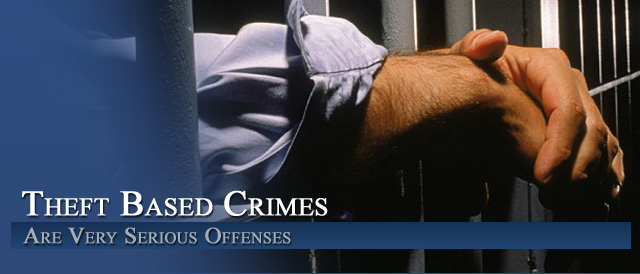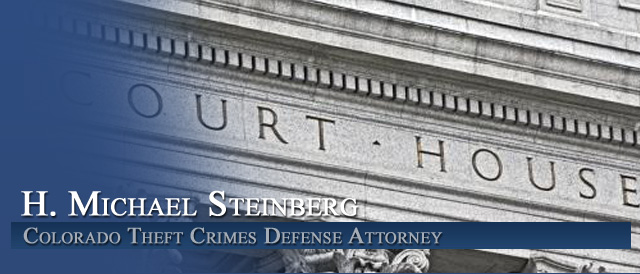




Aug 02
Putting Two And Two Together – Aggregating Two Or More Misdemeanor Colorado Theft Charges Into Felony Theft – 18-4-401 (4) (a)
By Colorado Theft Crimes Defense Lawyer H. Michael Steinberg
One of the most significant provisions in Colorado’s Theft law is a brief but important provision that empowers prosecutors to “aggregate” or “consolidate” separate smaller misdemeanor thefts into one – much more serious crime – Felony Theft.
Here are the relevant portions of Colorado’s Theft Law 18-4-401
18-4-401. Theft
(1) A person commits theft when he or she knowingly obtains, retains, or exercises control over anything of value of another without authorization or by threat or deception; or receives, loans money by pawn or pledge on, or disposes of anything of value or belonging to another that he or she knows or believes to have been stolen, and:
(a) Intends to deprive the other person permanently of the use or benefit of the thing of value;
(b) Knowingly uses, conceals, or abandons the thing of value in such manner as to deprive the other person permanently of its use or benefit;
(c) Uses, conceals, or abandons the thing of value intending that such use, concealment, or abandonment will deprive the other person permanently of its use or benefit;
(d) Demands any consideration to which he or she is not legally entitled as a condition of restoring the thing of value to the other person; or
(e) Knowingly retains the thing of value more than seventy-two hours after the agreed-upon time of return in any lease or hire agreement.
(1.5) For the purposes of this section, a thing of value is that of “another” if anyone other than the defendant has a possessory or proprietary interest therein.
(2) Theft is:
(b) A class 1 petty offense if the value of the thing involved is less than fifty dollars;
(c) A class 3 misdemeanor if the value of the thing involved is fifty dollars or more but less than three hundred dollars;
(d) A class 2 misdemeanor if the value of the thing involved is three hundred dollars or more but less than seven hundred fifty dollars;
(e) A class 1 misdemeanor if the value of the thing involved is seven hundred fifty dollars or more but less than two thousand dollars;
(f) A class 6 felony if the value of the thing involved is two thousand dollars or more but less than five thousand dollars;
(g) A class 5 felony if the value of the thing involved is five thousand dollars or more but less than twenty thousand dollars;
(h) A class 4 felony if the value of the thing involved is twenty thousand dollars or more but less than one hundred thousand dollars;
(i) A class 3 felony if the value of the thing involved is one hundred thousand dollars or more but less than one million dollars;
and
(j) A class 2 felony if the value of the thing involved is one million dollars or more.
[HMS – To track the possible penalties for each of the above levels of crimes – CLICK HERE:](4) (a) When a person commits theft twice or more within a period of six months, two or more of the thefts may be aggregated and charged in a single count, in which event the thefts so aggregated and charged shall constitute a single offense, the penalty for which shall be based on the aggregate value of the things involved, pursuant to subsection (2) of this section.
(b) When a person commits theft twice or more against the same person pursuant to one scheme or course of conduct, the thefts may be aggregated and charged in a single count, in which event they shall constitute a single offense, the penalty for which shall be based on the aggregate value of the things involved, pursuant to subsection (2) of this section.
Defending Against Section – 18-4-401 (4)(a)
Section 4(a) requires that the aggregated thefts ALL be completed within a period of 6 months. The defense will attack the timing of the thefts and argue they were ongoing transactions and extended outside the 6 months deadline
Defending Against Section – 18-4-401 (4)(b)
Section 4(b) dismisses the need to consolidate the crimes within a specific time period if the thefts targeted ONE PERSON. Under these circumstances – the thefts only need to be consolidated within the statute of limitations..
The authority provided to the State – vis a vis the District Attorney – is clear – several smaller cases when combined into one felony case permits a sentence to be sought in the felony ranges above..
If your Colorado Felony Theft Case has been consolidated under these circumstances – please feel free to contact our law firm to discuss what that means to your defense.
Aggregating Two Or More Misdemeanor Colorado Theft Charges Into Felony Theft – 18-4-401 (4) (a)
Denver Colorado Theft Crimes Criminal Defense Lawyer
ABOUT THE AUTHOR: H. Michael Steinberg – Email The Author [email protected] or call his office at 303-627-7777 during business hours – or call his cell if you cannot wait and need his immediate assistance – 720-227-7777.
If you are charged with A Colorado crime or you have questions about Aggregating Two Or More Misdemeanor Colorado Theft Charges Into Felony Theft – 18-4-401 (4) (a)], please call our office. The Law Offices of H. Michael Steinberg, in Denver, Colorado, provide criminal defense clients with effective, efficient, intelligent and strong legal advocacy. We can educate you and help you navigate the stressful and complex legal process related to your criminal defense issue.
H. Michael Steinberg, is a Denver, Colorado criminal defense lawyer with over 40 years of day to day courtroom experience – specializing in Colorado Criminal Law along the Front Range. He will provide you with a free initial case consultation to evaluate your legal issues and to answer your questions with an honest assessment of your options. Remember, it costs NOTHING to discuss your case. So call now for an immediate free phone consultation.
Helping Clients To Make Informed Decisions In the Defense of Colorado Criminal Cases.
You Might Also Enjoy:
- 2013 Colorado State Legislature Increases Theft Crime Limits – More Realistic Approach Is Praised
- Colorado Criminal Law – Don’t Even Try To Contact A Victim Or Witness – Criminal Tampering – § 18-8-707
- Colorado Theft Of Automobile License Plates – Section 42-5-104(4) C.R.S.
- Colorado Criminal Law – The Difference Between Identity Theft 18-5-902 & Unauthorized Use Of A Financial Transaction Device 18-5-702
- Colorado Springs Sees Massive Increase In Colorado Crime Of Aggravated Motor Vehicle Theft Under C.R.S. 18-4-409













